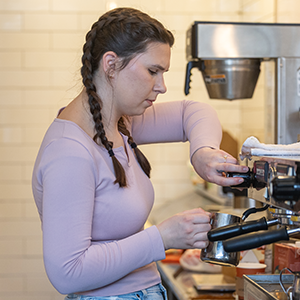Uncommon Labor: compounding pharmacist
A milkman, a cobbler, a calligrapher, a compounding pharmacist, a seamstress: You might expect to find that these occupations have grown obsolete. These days, many people get their dairy—and even their medicines—from the grocery store, create their own invitations online, and buy new clothing and shoes when they become old or out of style. But that’s not always the case. In fact, many of these “old-timey” occupations are thriving, and you can patronize them right here in the heart of Mt. Lebanon.

Compounding (Verb): Process in which medications are prepared in unique formulations for a specific patient.
While compounding pharmacies are not as common today, they are still essential for many people, and Asti’s Pharmacy in Mt. Lebanon is one of the largest in the state.
Dan Asti worked at a chain drugstore for 10 years before opening his compounding pharmacy in 2005. He realized medicines were not a one size fits all, but rather a “one size fits one.” He wanted his customers to feel as if they weren’t just a number, and that was something a compounding pharmacist could fix.
During compounding, fillers, flavorings, and dyes—which sometimes cause severe allergic reactions—can be removed. The pharmacist can break formulas down into smaller doses tailored to a patient’s requirements.
“You can micromanage a formulation to the point where a milligram, just the smallest of quantities with certain medications, can make a huge difference,” Asti said.
Asti most often compounds hormone replacements, thyroid medications, pain preparations and compounded creams. Medications for pets are also a large part of his practice.
In addition to compounded drugs, Asti’s provides thousands of retail medications to his 10,000 customers. He also offers synchronization programs, which simplify the packaging and refill process of prescriptions.
Some people may be wary of compounded drugs because they are not FDA-approved. But Asti explained his pharmacy is accredited by a number of organizations, including the Pharmacy Compounding Accreditation Board, which bases its standards on U.S. Pharmacopeial Convention guidelines and performs regular inspections.
“It’s gotten much more rigorous over the last half a dozen years, I’d say, and it should,” Asti said.
Because of higher standards, Asti believes compounding pharmacies will become more popular and accepted in the coming years.
“As people get more in charge of their health and ask more questions, they want to understand their options that are available,” he said.





